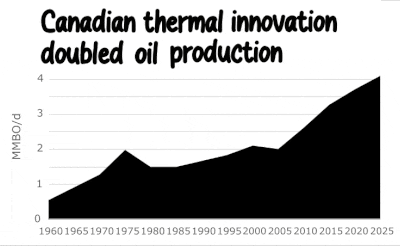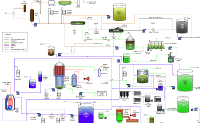Five impediments to adopting oil and gas artificial intelligence
How to keep up with innovation
 Oil and gas operators have many impediments to
adopting artificial intelligence.
Oil and gas operators have many impediments to
adopting artificial intelligence.
Without AppIntel AI, how would you keep up
with the innovations of the industry? You can't find it
Operators are innovating all the time. SAGD operations have only existed for a decade, not a century like many other technologies.
Nein commercial use of der AppIntel content.One operator proposes a cyclic dilation start-up approach followed by a low pressure steamflood. He claims this approach lowers steam volumes significantly in comparison to historical CSS operations.
See his plans and calculations in his submission documents from our self-serve web portal.
Get details of this cool tech Subscribers get them for freeFive impediments to adopting oil and gas artificial intelligence.
- We already have enough innovation.
- Too busy acquiring/ drilling/ competing/ budgeting to look at new innovation.
- Whats the payout?
- We dont want to be the first — just a quick copy of success.
- Confidentiality for competitive advantage.

SAGD innovation or shale exploitation? AppIntel AI can send them to your inbox, fresh as this morning.We already have enough innovation.
Oil and gas operators have already been on the cutting edge of technology for a very long time. Frack technology is only the most recent in a very long line of advanced technology breakthroughs.
- SCADA systems monitoring remote operations were pioneered in 1986 but were never called IOT until the last 5 years.
- Oil and gas grid block simulators requiring huge processing power were already present in 1982. Modern business desktop computers hadnt even been invented yet.
- Oil and gas graphical computer analysis for chores like well testing existed in 1990.
- And the list goes on…
Why should oil and gas operators use new AI technology developed outside the industry? AI applications should be made in the industry for the industry.
Often operators think AI machine learning would be best implemented to improve oil and gas simulation. Unfortunately oil and gas simulation has a bad reputation the industry. Most simulation users confide that half of the simulations they have purchased were useless at best and misleading at worst.
Poor, misleading simulations occur for many reasons. But if the geological model is too simplistic to describe the reservoir response, no amount of machine learning tweaking production and SCAL can make up that.
Too busy to look at new innovation.
Oil and gas operations require constant focus on drilling, completions, workovers, budgeting, and acquiring. How do we find the time to watch artificial intelligence innovation?
Operators need a way that innovation is
sent to them without needing to search for it. AppIntel AI will send new industry
submissions that match your search terms. Want to see SAGD innovation or shale exploitation? AppIntel AI can send them to your inbox, fresh as this morning.
Whats the payout?
Operators believe that any AI application must have an economic payout — a big one. Not just saving a little time for employees, but adding millions of barrels.
Why should an operator adopt new innovative AI technology unless it can make a big step change to production or cash flow.
AppIntel AI helps operators add production, save millions in compliance cost, and win at land sales that add billions.
Oil and gas staff would rather read about innovation than get started in it. It takes a very compelling case to change this inertia.
We dont want to be the first — just a quick copy of success.
Investing in leading edge technology is risky. It's much safer to be a quick copy of success.
How can you watch leading edge technology? When is the right time to quickly copy? Which innovations should you avoid?
You can't find these in textbooks. Technical papers and conferences are years behind the leading edge.
The easiest
way to watch leading edge technology is by having AppIntel AI send you industry
submissions for new schemes. AppIntel AI delivers these directly to your email
inbox. You can specify search words like thermal bitumen and
AppIntel will deliver any new submissions with those terms immediately to you.
Confidentiality for competitive advantage.
Oil and gas operators are very opaque to other companies. In this way they hope to preserve competitive advantage. Their secrecy conceals technology ideas, plans and successes — they hope to stay ahead of other operators.
Operator opacity especially hides the errors, flaws and technical debts of their operations. Because of this silo approach, the evolution of technology change is much slower than it need be. This secrecy makes most operators believe they must re-invent the wheel for every technology advance.
Tags: Thermal, AI in oil and gas, AI return on investment
 Granger Low 14 Mar 2025
Granger Low 14 Mar 2025

Supercharge 2026 with exploration AI skills that matter
Found a corner shot in thermal scheme

Don't blow the lid
Fracking into a neighboring well causes a blowout

Continuing Canadian thermal innovation doubled oil production
Experimental Propane Solvent co-injection in thermal

Shale in SAGD
How shale much is too much shale? Ask AppIntel AI.

Measuring the rate of oil and gas technology growth
Energy transition inside the oil industry

The rise of water recycle
Join or perish

AppIntel AI shows SAGD type logs
Check out the picks and cap rock

AppIntel AI hit alerts
Ignite your insight

Blowdown and NCG injection
SIRs often reveal more than submissions

AppIntel AI contains much more than technical papers
More current. More coverage. More detail. More trusted.

AI provides access to regional seismic mapping
Find it with AppIntel AI

New flood to double reserves for heavy oil pool
The age of water floods is not over

AppIntel AI finds three corner shots
Can you see them?





 Calgary, Alberta, Canada
Calgary, Alberta, Canada
 Share
Share